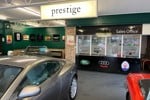Cherry picking -once restricted to the more desirable corners of the used car market -is now universal. Whether it is on late plate cars, where colour can make a difference of £500, or on three to five-year-old ex-lease and contract hire cars, cherry-picking is driven by the slowdown in retail demand. Most dealers are in a position now where they can afford to be picky when buying for stock: this is particularly evident in the executive sector where spec is always important, even when times are good. Then, buyers will often have a go at the odd flat-coloured car as long as it has reasonable spec. Today, this is no longer true. What sellers of these vehicles must be aware of is that, if a car is not quite 100%, the reserve must be realistic. As a guide, we follow the market as closely as possible and you will now see that in many cases the gaps between Cap Clean, Average and Below Average have widened to take cherry-picking into account. Compounding the current problems, we have grey and parallel imports. The grey import market seems to be here to stay and its credibility and level of professionalism constantly improves. It has evolved from a risky niche to a genuine force to be reckoned with as an accepted part of everyday business. But the biggest impact stems from parallels -a market that has also grown tremendously quickly over the past couple of years. This market benefits from constant exposure in the popular press and most sectors are affected in some way by cars from Europe. Dealers complain about the customers they lose to parallels. Executive dealers in particular regularly report how tired they are of taking prospects out on test drives and never seeing them again until they turn up for servicing with a European car. There is nothing to be done about this in a free market and the only way to stop it is to negate overseas savings. Porsche has succeeded by cutting list prices. More than 30% of new Porsches registered in the UK last year were sourced from abroad. But the carmaker's brave action solved the problem in one fell swoop. Porsche, though, is a small player in volume terms and its action has not led to the kind of domino effect which would follow similar measures by Ford, Vauxhall, Peugeot or Renault. It will take a bigger player to influence the entire market. Many in the trade agree that the most effective way to boost consumer confidence and stir up retail demand is a headline-grabbing price reduction. Nobody should be afraid of this and the oft-quoted impact on residuals -as an excuse against price cuts -is a fallacy. As we have repeatedly demonstrated, except on the latest plate vehicle, there is virtually no relationship between new and used price. From deals already on offer, manufacturers must by now have a good idea of what makes an acceptable transaction price for the UK customer. They are already doing the deals so it is becoming increasingly difficult to see why they don't bite the bullet and once and for all give retail punters clear understanding of where they stand.
Slowdown in retail demand leads to universal 'cherry picking'
- By
- |
- 7 July 2000
- News













Login to comment
Comments
No comments have been made yet.